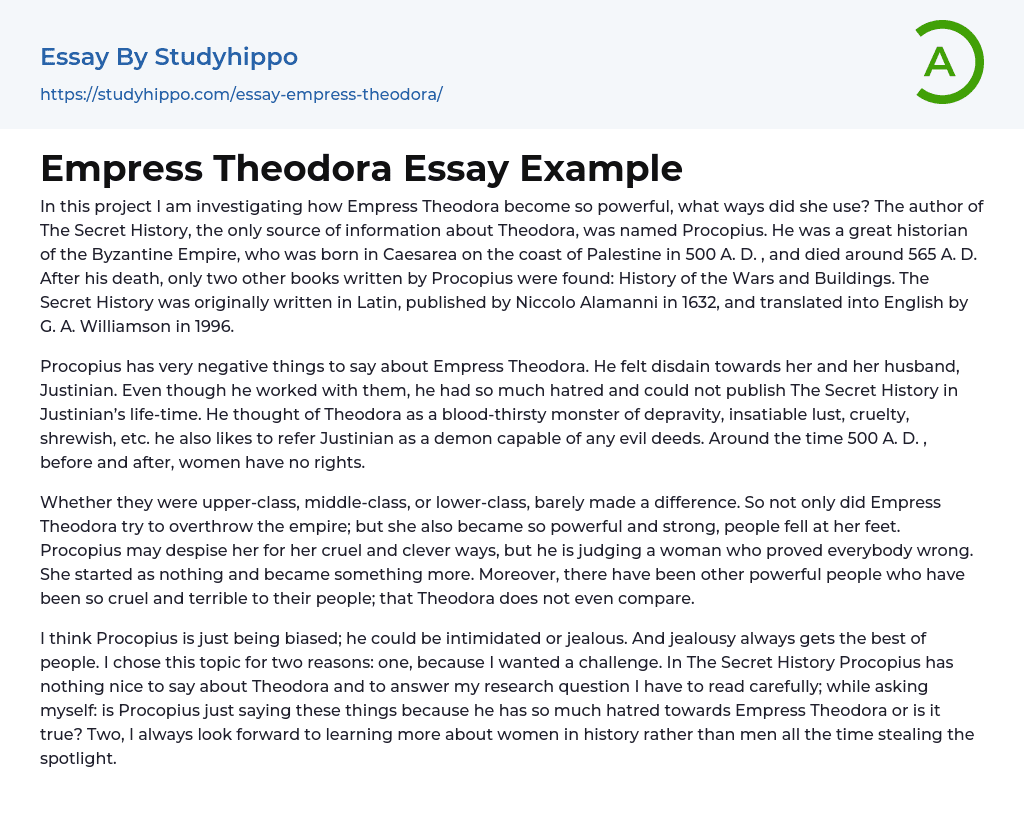
The main goal of this project is to analyze the strategies employed by Empress Theodora in her quest for power. Procopius' book, The Secret History, serves as the primary source of information about Theodora. Procopius, a renowned historian from the Byzantine Empire, was born in Caesarea, Palestine around 500 A.D. and passed away approximately in 565 A.D. Apart from The Secret History, Procopius authored two other books: History of the Wars and Buildings. Originally written in Latin, Niccolo Alamanni published The Secret History in 1632 before it got translated into English by G.A. Williamson in 1996.
During his time working with Empress Theodora and her husband, Justinian, Procopius developed a strong dislike for them. His hatred was so intense that he refrained from publishing The Secret History until after Justinian's death. Procopius portrayed Theodora as a
...monstrous figure infamous for her bloodthirstiness, depravity, insatiable lust, cruelty, and shrewishness. Similarly, he depicted Justinian as a demonic being capable of committing any evil acts. This negative perspective on women's rights was prevalent during the time period around 500 A.D., persisting both before and after this era.
Regardless of their social class, whether they were upper-class, middle-class, or lower-class, it made little difference. Empress Theodora not only attempted to overthrow the empire but also gained immense power and strength, causing people to submit to her. Despite Procopius condemning her brutal and cunning actions, he is passing judgement on a woman who defied expectations. She started with nothing and rose to something greater. Furthermore, there have been other individuals in history who wielded power in such a cruel and terrible manner that Theodora cannot b
compared to them.
I believe Procopius is displaying bias, possibly due to intimidation or jealousy, as these emotions tend to cloud judgment. I chose to focus on this topic for two reasons. Firstly, I wanted to challenge myself by examining Theodora's portrayal in Procopius' The Secret History, which is consistently unfavorable. To effectively answer my research question, I must carefully scrutinize Procopius' motivations: is his negative rhetoric towards Empress Theodora rooted in intense hatred, or is there some truth to his claims? Secondly, I am intrigued by the opportunity to expand my knowledge on women in history, as opposed to constantly highlighting men.
- Child essays
- Childcare essays
- Child labor essays
- Doll essays
- Culture essays
- Social Control essays
- Citizenship essays
- Social Justice essays
- Caste System essays
- Social Responsibility essays
- Socialization essays
- Deviance essays
- Modern Society essays
- Popularity essays
- Civil Society essays
- Community essays
- Female essays
- Filipino People essays
- Igbo People essays
- Indigenous Australians essays
- Indigenous Peoples essays
- Minority Group essays
- Social Institution essays
- Men essays
- The nation essays
- Middle Class essays
- Social Norms essays
- Discourse Community essays
- Popular Culture essays
- Car Culture essays
- American Culture essays
- Mormon essays
- Indian Culture essays
- Mexican Culture essays
- Pop Culture essays
- Cultural Differences essays
- Culture Shock essays
- Different Cultures essays
- World War I essays
- World War Ii essays
- Atomic Bomb essays
- American Civil War essays
- Attack essays
- Cold War essays
- Crimean War essays
- Emilio Aguinaldo essays
- Iraq War essays
- Korean War essays
- Nazism essays
- Nuclear Weapon essays



